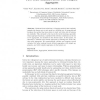Free Online Productivity Tools
i2Speak
i2Symbol
i2OCR
iTex2Img
iWeb2Print
iWeb2Shot
i2Type
iPdf2Split
iPdf2Merge
i2Bopomofo
i2Arabic
i2Style
i2Image
i2PDF
iLatex2Rtf
Sci2ools
ILP
2004
Springer
2004
Springer
First Order Random Forests with Complex Aggregates
Random forest induction is a bagging method that randomly samples the feature set at each node in a decision tree. In propositional learning, the method has been shown to work well when lots of features are available. This certainly is the case in first order learning, especially when aggregate functions, combined with selection conditions on the set to be aggregated, are included in the feature space. In this paper, we introduce a random forest based approach to learning first order theories with aggregates. We experimentally validate and compare several variants: first order random forests without aggregates, with simple aggregates, and with complex aggregates in the feature set. Keywords Random forests, Aggregation, Decision Tree Learning
Feature Set | ILP 2004 | Random Forests | first Order |
Related Content
| Added | 02 Jul 2010 |
| Updated | 02 Jul 2010 |
| Type | Conference |
| Year | 2004 |
| Where | ILP |
| Authors | Celine Vens, Anneleen Van Assche, Hendrik Blockeel, Saso Dzeroski |
Comments (0)

